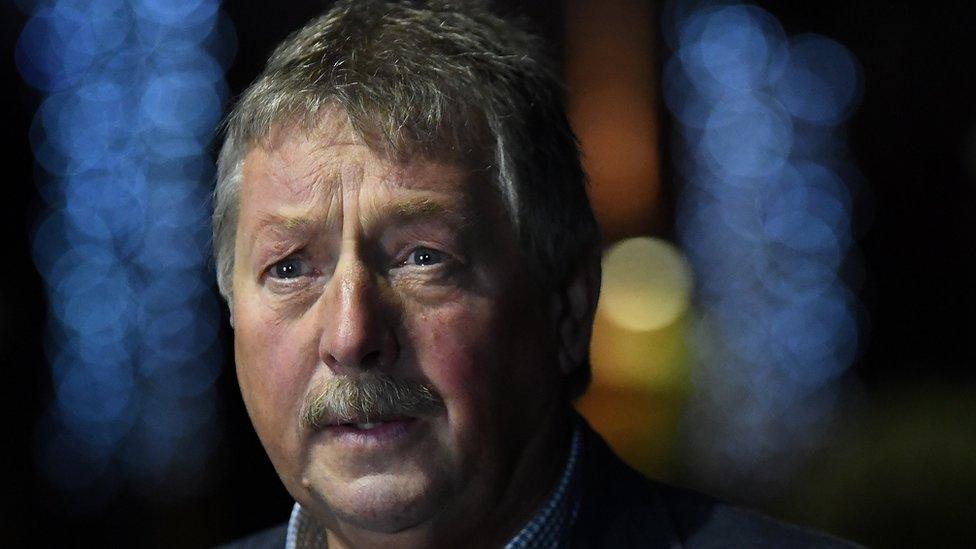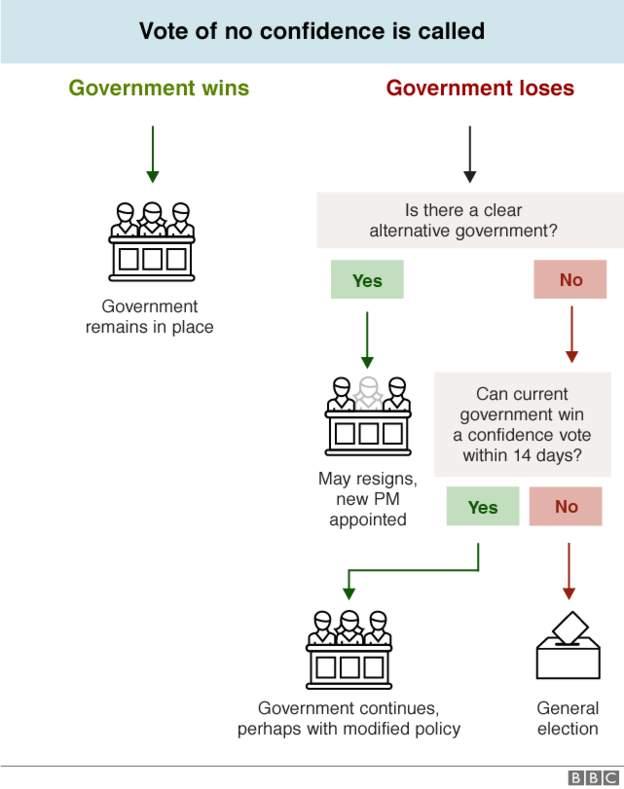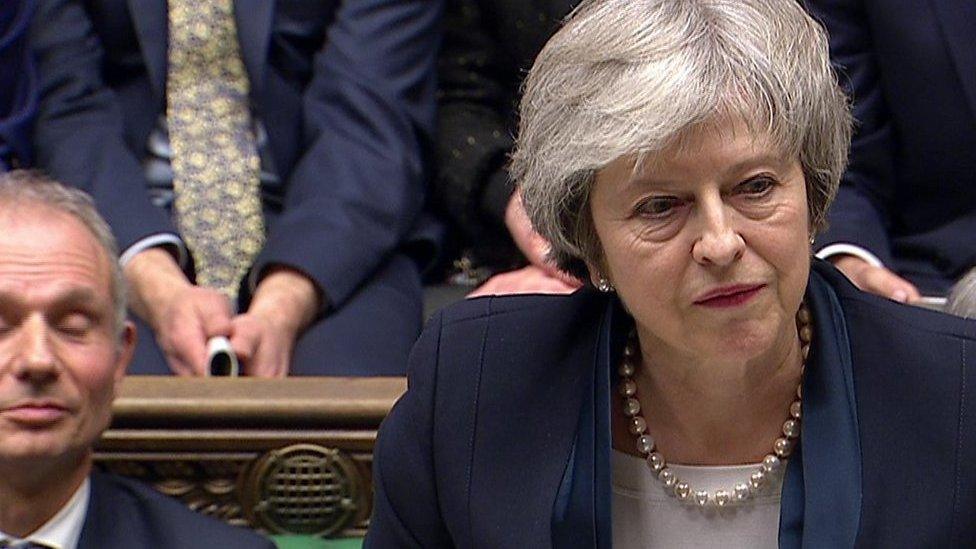Brexit: EU has hard questions to answer, says DUP
- Published

Sammy Wilson said the prime minister could not carry on with her deal
The EU has "hard questions to answer now" after Theresa May suffered a huge defeat on her Brexit deal, a Democratic Unionist Party (DUP) MP has said.
The prime minister lost a vote on her deal by 230 votes - the biggest government defeat in modern times.
Labour has tabled a no confidence motion in the government but the DUP has said it will support Mrs May.
DUP leader Arlene Foster said they would work constructively with the government to get a better deal.
Opposition to the plan focused on the backstop, the insurance policy to avoid a hard Irish border after Brexit in the event of a wider trade deal not being reached.
Mr Wilson told the BBC he believed the defeat cemented his party's concerns about the backstop, and urged the prime minister to go back to Brussels and renegotiate the withdrawal agreement.
"Go back to the EU and make it clear this deal's not going to work," he said.
"There is no point in keeping something on the table when it's been kicked off the table, kicked out of the room."
Confirming the DUP would back the government in a no-confidence vote on Wednesday, Mr Wilson said his party "never wanted a change of government, we wanted a change of policy".
Has the Irish government said anything?
The Irish government said it regretted the outcome of the vote and that it believed it increased the risk of a "disorderly Brexit".
'We now need to be patient and calm'
It will continue to intensify its preparations for a no-deal Brexit, it added.
"The Irish government recognises, however, that a disorderly Brexit is a bad outcome for everyone, not least in Northern Ireland," the statement continued.
"It is not too late to avoid this outcome and we call on the UK to set out how it proposes to resolve this impasse as a matter of urgency."

Back(stop) to the drawing board?

Analysis by Jayne McCormack, BBC News NI political reporter
Parliament has spoken, issuing a resounding "no" to Theresa May's deal.
The government must now take stock but will it be back(stop) to the drawing board with a new plan for the Irish border?
The DUP is hoping that's the case.
All along, it has said there is no need for such a mechanism and managed to get more MPs on its side than the government did.
Mrs May was still insisting there would be no deal at all without the backstop, but now she will surely have to return to Brussels and ask for something else.
It's not yet clear what that something else is - and given the EU and Irish government both say the deal's not up for renegotiation, the coming days and weeks ahead seem shrouded in political fog.

How have other NI parties reacted?
Sinn Féin leader Mary Lou McDonald said the result reinforced the need for the Irish government to "stand firm" on the backstop.
"We need to say clearly to the British that if they wish to Brexit then that's a matter for themselves, but any Brexit agreement needs to recognise, understand and protect the people, the economy and the peace process on this island," she added.
Allow X content?
This article contains content provided by X. We ask for your permission before anything is loaded, as they may be using cookies and other technologies. You may want to read X’s cookie policy, external and privacy policy, external before accepting. To view this content choose ‘accept and continue’.
Ulster Unionist leader Robin Swann said the government needed to "grab this process by the scruff of the neck and seek an extension to Article 50" - a law which triggered the process of Brexit.
SDLP leader Colum Eastwood said the backstop was "essential".
"Northern Ireland's economy and stability can't be sacrificed because politicians in London have failed to recognise the obvious," he added.
While Alliance leader Naomi Long said the scale of the prime minister's defeat was "surprising", and said the only way forward was to have another referendum.
What have businesses said?
A large number of business and farming groups had urged MPs to back the deal and have reacted with concern at its rejection.
The Northern Ireland Chamber of Commerce said MPs most now "move beyond tactical manoeuvring."
Chief executive Ann McGregor added: "The endless Westminster back-and-forth only causes business frustration to mount further."
British-Irish Chamber director John McGrane said his organisation regretted the result.
He said he still believed the "passing of the withdrawal agreement is the only option currently available that will ensure Brexit happens in an orderly way".
Confused by Brexit jargon? Reality Check unpacks the basics
Retail NI's chief executive Glyn Roberts said although Mrs May's deal was not "perfect", it still represented a path towards some form of certainty.
The Federation of Small Business in Northern Ireland said time was running out to avoid "a chaotic no-deal."
"It is imperative political leaders sharpen their focus and do all they can to reach agreement in the short time possible," said the federation's Tina McKenzie.
Aodhán Connolly, director of the NI Retail Consortium, said the rejection of the deal would be a "cause for concern" across the business community in Northern Ireland.
"We are now closer than ever to the possibility of a no deal that will be a disaster for Northern Ireland."
What happens next?
Labour leader Jeremy Corbyn has tabled a no confidence motion in the government, which could trigger a general election.
MPs will debate that throughout most of Wednesday, with a vote taking place at 19:00 GMT.

The DUP, which props up the Conservative minority government, has said it will back the government, which means the motion is likely to fail at this stage.
If the government wins the vote, Mrs May must return to Parliament on Monday 21 January to set out the way forward.
- Published15 January 2019

- Published30 July 2019

- Published14 January 2019